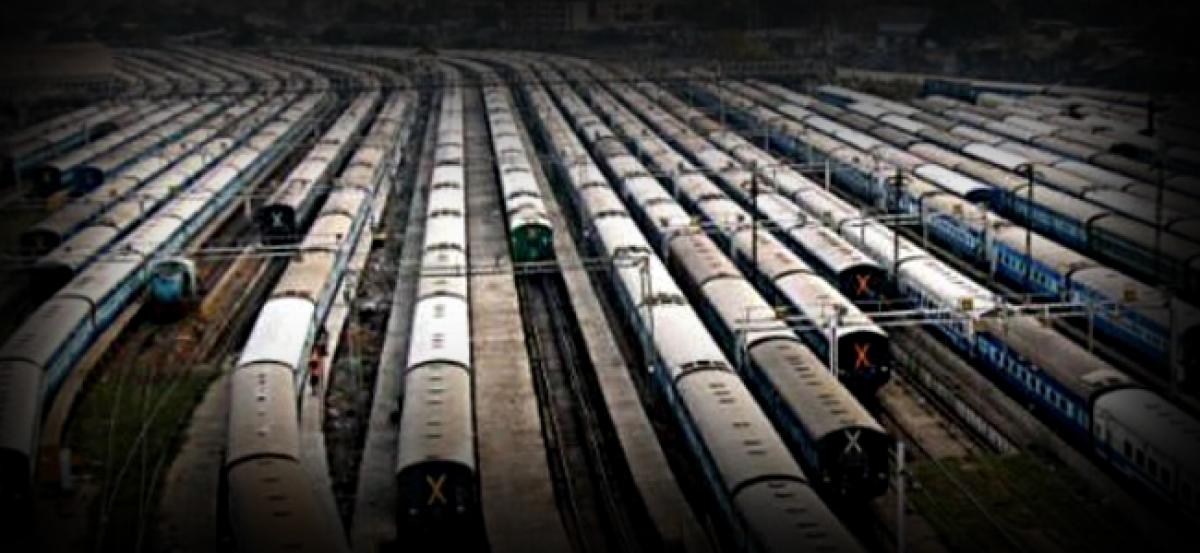Live
- Manchu Manoj Calls for Justice and Trusts in Police
- Surge in construction of illegal farmhouses in Aravallis, Sohna Council issues notice
- Karnataka BJP Criticizes Siddaramaiah Over Wayanad Housing Project
- Lathi-charge on students in Hazaribagh kicks up political row; demand for CBI probe grows
- India’s growth to rebound to 7 pc in 2025-26: Report
- Union Minister Rammohan Naidu inaugurates Airport Predictive Operation Center in Hyderabad
- Delhi has decided to elect BJP CM, oust AAP govt: Harsh Malhotra
- Congress-led UDF winning streak continues in Kerala, ruling CPI-M-led Left suffers reversal
- The Key Players Behind IPL: Discover the Franchise Owners and Their Success Stories
- Harris and Gill join Sydney Thunders for WBBL 11
Just In

India\'s congested cities are awarding new rail projects at a record rate, creating a boon for companies such as Siemens to Larsen & Toubro Ltd in a sector forecast to offer $5.8 billion worth of orders next year.
New Delhi: India's congested cities are awarding new rail projects at a record rate, creating a boon for companies such as Siemens to Larsen & Toubro Ltd in a sector forecast to offer $5.8 billion worth of orders next year.
India currently has about 300 km of operational metro track laid across seven cities in a country with an urban population of 400 million, a network that is smaller than the size of London's Tube network which serves a city of nearly nine million.
In a bid to boost public transport, Government last week said it would boost the budget to expand the Delhi metro by almost a third on the previous year, as well as provide more funding for other state authorities.
Analysts at Axis Capital estimate India will award construction of 650 kms of track worth 2 trillion rupees over the next three to five years. Annual metro rail-related orders in India have totalled about 200 billion rupees in each of the last three years.
Even if some of those projects remain on paper, the potential for manufacturers and engineering firms like Germany's Siemens, France's Alstom SA and locals like BEML Ltd and Larsen & Toubro Ltd is too big to ignore.
"The way metro rail boomed in China is about to happen in India," said Tilak Raj Seth, the head of Siemens India's transport business, which is supplying signalling and electricification for projects in Delhi and Chennai.
Bombardier India's unit, part of the Canadian group, has a backlog of 160 metro coaches and forecasts demand for another 3,000 by 2021.
Alstom India Ltd is on course to double the revenue earned from metro projects to 200 million euros ($220 million) this financial year and is targeting 1 billion euros a year by 2021, its managing director said.
"What India completed (in laid tracks) in the last 20 years, I would expect that we will complete that in the next 2-3 years," managing director Bharat Salhotra said.
He said Alstom would spend 25-30 million euros over the next few years to expand its Indian factories, after winning orders to supply carriages for the cities of Jaipur and Kochi.
Rush hour
India's rush to build more metros is a late one: booming populations and rising car ownership have created traffic-choked cities, slowing movement of goods and people in the places where most of future economic growth will be made.
China has built metro rail networks in about 25 cities spanning more than 2,000 kilometres, largely in the last two decades, while India has barely managed 300 kilometres, most of it in Delhi, in 13 years.
It's a rate of construction India needs to quickly up as its urban areas are expected to become home to an additional 200 million people by 2030.
As well as the projects in 19 cities completed or approved, at least eight more cities including Patna and Agra, have drawn up plans - although experts caution at least some of the schemes will remain on paper.
Other cities have struggled. Mumbai has managed to build just 11 kilometres of track in a decade, after problems acquiring land and contractual disputes. A new line in the southern tech hub of Bengaluru has missed a series of deadlines for completion.

© 2024 Hyderabad Media House Limited/The Hans India. All rights reserved. Powered by hocalwire.com







